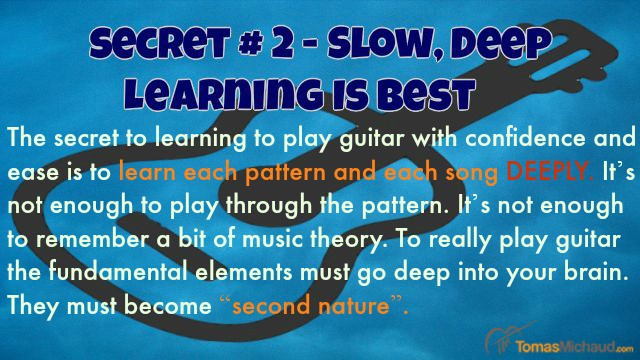
“Slow Deep Guitar Learning” – What Is It And Why Is It Important?
Fast is always better… right? Not always. When learning to play guitar slowing down the learning process can actually lead to better results. In addition, it can lead to more satisfaction and enjoyment.
Slow deep learning is not a new concept. The Slow Education Movement is well known in the education community. What does it mean when learning guitar?
Slow learning is a combination of several factors including:
- Spending more time on each new concept or exercise
- Using a concept or technique in different ways
- Focusing on less things for longer periods of time
- Doing more repetition before moving on
Are We Impatient?
Unfortunately we are all influenced by a culture that tends to repeat the mantra of immediate gratification. We’ve come to expect immediate results. If it doesn’t happen soon enough we just move on.
The behavior of expecting immediate results works okay when flipping through television channels, (though it might piss off your significant other). When learning guitar it leads to less than stellar results.
In his article Does The Internet Make You Dumber?, the author Nicholas Carr points out that the overwhelming abundance of stimulus that the media and internet provide is negatively affecing our ability to focus. Nobel Prize winning neuroscientist Eric Kandel writes that only by paying deep attention to each piece of new information can we associate it “meaningfully and systematically with knowledge already well established in memory”.
These “associations” are exactly what’s needed to learn a complex skill such as playing guitar.
Learning To Play Guitar Is Learning A Language
The best way to learn guitar is very similar to learning another language. Years ago I decided to set a goal to speak Spanish. After thinking about it for awhile I decided the best thing to do was enroll in classes at my local community college. Makes sense, right?
At the time I already had a college degree, and in the process of getting one I learned how to work the system to get good grades. Basically I learned to figure out what I would be graded on, then study for that, (often the night before), and it was just what I needed to ace the test. I graduated with honors.
I applied this same studying technique to three quarters of Spanish classes. Not only did I pass, but I got top grades! After almost a year I could write a letter in Spanish, albeit slowly. I could pass grammar tests. Aced them. But I couldn’t speak Spanish… maybe a few words, but I quickly discovered that Spanish speakers couldn’t understand my pronunciation of the little vocabulary I had acquired.
Looking back I can see I had done the quick and shallow learning process with speaking Spanish. I had done enough to move on to the next chapter and to pass all the exams. It looked good “on paper”, but the results told the real story.
Two Great Things That Came Out Of This Experience
First, after pondering the error of my ways, I decided to join a class that took me to Spain and had me live with a family that was instructed not to speak a word of English. Not ONE WORD. Of course it was difficult at first, but after 10 days I could speak Spanish. I just concentrated on a limited vocabulary and kept repeating it until people could understand me. Then I could ask for food, get around the city and, most importantly, ask where the bathroom is.
Secondly, and perhaps most importantly, I came to grips with what it takes to really learn a skill like speaking a foreign language. I’ve applied this understanding to my own development and to creating courses that apply the same principles to help others.
Learn Deeply, Play Guitar Easily
Sometimes jumping from one thing to another seems like fun at the time, but when learning to play guitar it eventually leads to dissatisfaction. That's because you'll know a little about many things, but be a master of none.
The main reason to learn deeply is simple…this is where the magic happens. That's how you build the confidence to play easily and fluidly. Learning to play guitar this way will help you to stay motivated, experience a deep sense of satisfaction, and leads to the type of happiness that comes from expressing yourself with ease.
What Can You Do (Actions)?
Do more Reps
When doing exercises don’t be too quick to move on to the next one. Keep pushing yourself past where you feel bored. Challenge yourself a little at a time. Develop your attention muscle. Instead of doing three reps do five. Instead of doing it for three days do it for a week… or two.
Support Your Instructor To Help You
If you are taking private lessons this one is for you. Many instructors think they need to keep presenting new material to keep the students attention. They are usually right. However this is not in the best interest of the student.
I’ve seen many students (and parents) badger the instructor for “something new” to make the lesson more interesting. While there is a time and place for “new and exciting”, this behavior is more likely to produce a shallow learning experience. As a student you can take more responsibility for your guitar education. Tell your teacher you are okay with working on one thing for awhile… and mean it.
Apply And Make It Your Own
Find ways to make an exercise your own. Try playing around with it. Record it and listen back. Play around with a rhythm device like a drum machine or metronome. Make up your own exercises or songs based on something you're working on.
Here are some steps to have some fun with guitar scales and get a deeper learning experience:
1) Practice the guitar scale first by itself
2) Play along with a metronome
3) Play the scale with a prerecorded Jam Track
As always start slow and build up speed.
You can apply this idea to other aspects of playing guitar such as changing chords.
Practice With Others
Music is a wonderful thing to share with others. I know what you’re thinking… “I’m not good enough”, “I don’t want someone else to hear how bad I am”, etc., etc., etc. I’ve heard it all…in my own head 🙂
Yes, playing in front of others can be scary, but the benefits outweigh the fear. And guess what? You’ll likely get over it… and even get better!
If you connect with others that are about your same level it’s less scary. Extra points if you can get together with someone better than you at playing guitar.
Focus On What You Are Doing
Seneca may have put it best 2,000 years ago: “To be everywhere is to be nowhere.”
Spend some time putting your full attention on what you're doing when you're practicing. I know some people practice while watching TV (including myself). This is okay sometimes, but don't make that your only practice.
I once read a story about a group of classical musicians that found that rather than practicing more hours they could excel by strategic exercises to practice, and paying more attention during their practice sessions.
Review The Fundamentals
“When I was young, I had to learn the fundamentals of basketball. You can have all the physical ability in the world, but you still have to know the fundamentals.” — Michael Jordan
Make time to go back and review earlier material. It's especially beneficial to keep improving on the basics. Being able to play guitar easily comes from having a solid foundation. Ease and confidence comes when the fundamentals become second nature, when you don’t have to think when changing chords or when you reach for a note.
These are just a few ideas of how you can make use of the principle “Deep Slow Learning Is Best”. You can find more ways to make what you learn become deeply ingrained. All it takes is a little imagination and willingness to slow down.
How Can You Apply This Secret?
In what way can you apply this secret to learning guitar? Write something in the comment field
Related Posts:
Guitar Learning Secret #3 – Learn In The Correct Order
Tell Us What You Think - Please Comment Below!
We would love to hear your comments and questions. What specific things are you struggling with while learning guitar?

Very good…Thank you for this! What are some good songs to practice to? And when should you move on to bar cords? Do you know any of Jack Johnson songs?
Very good…Thank you for this! What are some good songs to practice to? And when should you move on to bar cords? Do you know any of Jack Johnson songs?
Hello Daniel,
You can find in Tomas Michaud’s Playlist Easy Guitar Songs to Learn here https://www.youtube.com/playlist?list=PL2fVuWCtWUdpcMD8z1pzLvMT1USvVRa4S
and for your question regarding bar chords, please watch this video as well My System for Playing Bar Chords That Never Fails – Guitar Lessons for Beginners https://www.youtube.com/watch?v=wsRu8eGNIM4.
Thanks to you, Daniel. Have a great time playing guitar.
Take care,
Hazel
Starland Guitar
Customer Support
Thanks for your sincere appreciation.